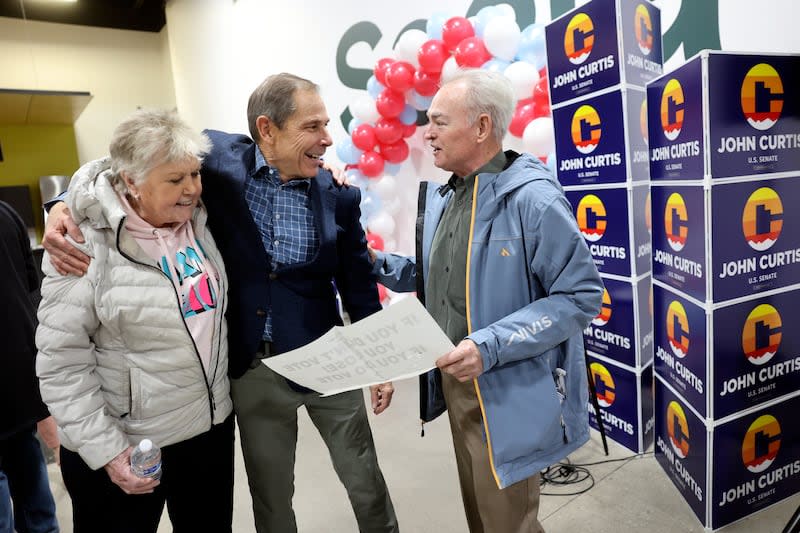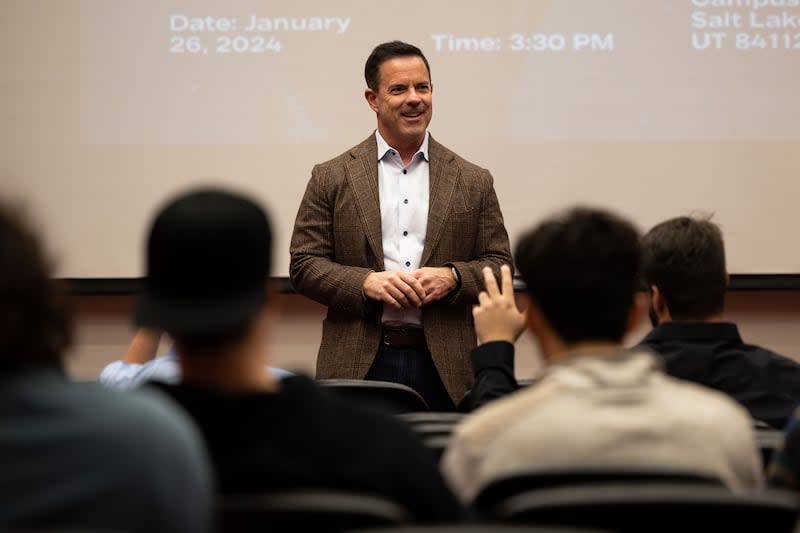Republicans in race to replace Sen. Mitt Romney try to differentiate themselves

- Oops!Something went wrong.Please try again later.
- Oops!Something went wrong.Please try again later.
- Oops!Something went wrong.Please try again later.
- Oops!Something went wrong.Please try again later.
At the beginning of Senate candidate and current Congressman John Curtis’ introductory ad, a booming voice says, “John Curtis has done more for Utah than anyone.” Curtis makes a face, and says, “Hold it, that sounds too much like a typical politician. Start over.”
The ad goes on to introduce voters to his family, his resume, and the issues he’s running on, like wasteful spending, energy independence, border security and standing up to the federal government.
The ad includes a little red meat for his Republican audience: “He stood up to President (Joe) Biden and voted repeatedly against his reckless spending,” the voiceover says.
For Brad Wilson, former speaker of the Utah House, his latest ad positions him as a “conservative fighter.”
It starts with Wilson speaking to a group of people. “Ronald Reagan once said that freedom is never more than one generation away from extinction,” he says in the ad. “It must be fought for it must be protected. And it must be handed on for them to do the same.”
The issues he mentions are similar to the ones mentioned by Curtis — reckless spending, tax cuts and protection of the values held by Utahns and the nation.
In his first ad, Brent Orrin Hatch, an attorney and son of the late Sen. Orrin Hatch, introduces himself to voters and offers a critique. “Why me?” he says. “Utah simply cannot afford another ‘Republican in name only’ representing our state. I’ve been a dedicated and proven conservative for my entire life.”
Hatch and the 10 other Republicans in the race — in addition to the three Democrats and two Independent American candidates — are fighting to replace fellow Republican Sen. Mitt Romney, who has faced blowback from some members of his party for his decision to speak out against former President Donald Trump. Romney decided not to run again, after serving one term in the Senate, saying he wanted to pass the opportunity to the next generation.
Trent Staggs, mayor of Riverton, entered the race before Romney had declared his decision not to run again. He is running as a strong Trump supporter who embraces the “MAGA” platform: low immigration, heavily enforced borders and low taxes and regulations.
All of the Republican candidates are in a race against time. Staggs has until the state Republican convention on April 27 to convince delegates he should get the nomination. The others, including Hatch, Curtis and Wilson, are collecting signatures to also get on the June 25 Republican primary ballot.
Either way, the window of time to get their message out to voters is already closing.
Who do polls show is ahead?
According to a January Deseret News/ Hinckley Institute poll, 52% of Utah voters said they hadn’t decided who they would vote for. Among those who drew support, 3rd District Rep. Curtis emerged as the frontrunner at the time, with 18%.
The second favorite in the poll was Hatch, with 14%, followed by Wilson at 8%.
While it’s a large pool of candidates in the running, “there’s a difference between a crowded field and a viable-crowded field,” Marty Carpenter, a partner at Northbound Strategy, said last month in an appearance on PBS Utah’s “The Hinckley Report.”
“There are going to be a lot of people in that (Senate) race, but there are only two viable candidates in the race right now,” he said, naming Curtis and Wilson.
Josh Ryan, a political science professor at Utah State University, said in an email to the Deseret News that Curtis is “the more moderate (and) pragmatic” candidate.
“He is in the model of people like Mitt Romney and Spencer Cox — yes they are Republicans, and they are conservative, but they aren’t firebrands in the same way a lot of other Republicans both in Utah and nationally,” said Ryan. He also contrasted the different approaches the candidates have taken to former President Donald Trump.
So far, Curtis has said he’ll vote for Trump if he is the Republican nominee, but has not endorsed him, as the Deseret News previously reported.
Wilson endorsed Trump in late January, saying he would “unite our party (and) secure a stronger future for America.” Hatch and Staggs, the first candidate to jump in the Senate race, are among the other Republicans who have also endorsed Trump.

John Curtis’ campaign focuses on his track record
Adrielle Herring, Curtis’s campaign manager, said in a statement to the Deseret News the Curtis campaign is “focused on winning the endorsement of all Republican primary voters and we’re encouraged to see that polling consistently has John in a very strong lead.”
According to a January poll by Cygnal, funded by ClearPath action fund, a clean energy group that endorses Republicans, Curtis was ahead with 32% compared to Wilson’s 9%, while it also had 52% of voters as undecided. The poll was conducted among 500 likely Utah Republican primary voters and had a margin of error of plus or minus 4.38%.
Before serving three terms in the House of Representatives, Curtis was the mayor of Provo, which has a population of around 114,000. “Between his former constituents and his entire congressional district, he’ll easily be able to get the 28,000 signatures,” said Zoe Nemerever, a political science assistant professor at Utah Valley University.
Herring said the Curtis campaign plans to submit the signatures soon and is “grateful for the amazing grassroots support” across the state. She added the campaign is excited about both “the convention and the primary” and is “working hard to win the support of both delegates and all Utah Republican primary voters.”
Brad Wilson and his lengthy list of endorsements
Wilson was the first to submit the required 28,000 signatures to qualify for the ballot in Utah.
As for the convention process, Ryan said, it “tends to favor the type of candidate Wilson is, as opposed to the type of candidate Curtis is.”
During the Republican 2024 Lincoln Day Dinner in mid-February, Wilson won the non-binding Washington County GOP straw poll with 40.5% of the vote. Curtis followed with 25%, and Staggs had 20% support.
Wilson also has a long list of endorsements from more than 50 Utah mayors and 22 sheriffs to almost the entire Republican caucus in the State Legislature, as Wilson’s campaign confirmed. Utah Gov. Spencer Cox has also endorsed Wilson.
“Brad Wilson is clearly outworking and outgunning the competition, which is why he leads the field in grassroots support, fundraising, and endorsements across the state,” said Gabby Wiggins, the spokeswoman for the Wilson campaign “Utahns are tired of the D.C. career politicians, and they can see that Wilson is a proven conservative fighter who will represent Utah in Washington, D.C., not the other way around.”

Curtis accuses Wilson of ‘negative campaigning’
On Dec. 7, an internal memo regarding a poll from the Wilson campaign indicated traditional GOP voters didn’t consider Curtis “very conservative.” This poll was published in the Washington Examiner before Curtis launched his campaign. At the time, Herring said there was a “full-court press to keep him out of the race.”
In her latest statement to the Deseret News, Herring said, “We are over four months away from election day, and Brad Wilson and his special interests have already turned to false, negative campaigning.”
“This is exactly why people are so frustrated with politics today and it’s not the Utah way,” she said. Herring said Curtis has a “strong, conservative track record of getting things done for Utah, and Utahns know it.”
“We see enthusiasm for John’s candidacy all over the state and we look forward to continuing to tell Utahns what John will do for them as their next U.S. senator,” she said.
Wilson’s campaign spokesperson Wiggins pushed back against the accusation, saying, “Brad Wilson has run a relentlessly positive campaign,” adding his record shows he has what it takes to “turn the country around.”
“If John Curtis can’t handle basic scrutiny about his record he doesn’t have the stomach to fight for Utah in the U.S. Senate,” she said.
Fundraising efforts
Among the long list of candidates, Wilson was leading in fundraising as of the end of 2023. According to the Federal Election Commission, he raised $3.5 million in 2023, including a $1.8 million loan to his own campaign.
Meanwhile, Curtis raised $1.48 million and spent $785,000, with more than $1 million cash on hand, according to his FEC report.
It’s worth noting that Curtis didn’t formally launch his campaign until late last month, and didn’t start fundraising for the Senate race until mid-November last year.
While money is important to run a Senate campaign, it “isn’t everything,” said Nemerever, a political science assistant professor at Utah Valley University. She noted that former Secretary of State Hillary Clinton outspent Trump and lost. When former Florida Gov. Jeb Bush ran his Republican presidential campaign, he was a fundraising success, with a $100 million war chest, but many other candidates “outlasted him by months,” said the political science professor.
“It’s important to know that Brad Wilson’s campaign fundraising is impressive, but it is not sufficient to win the election,” she said.
Nemerever said she expects this primary to be “a relatively close race,” like the 2nd Congressional District special election between former Republican state Rep. Becky Edwards and now-Rep. Celeste Maloy, who won the primary by six points after earning the Republican nomination at the convention.
“Curtis has much more significant political experience than Edwards,” she said. “Even if he doesn’t get the nomination from the delegate convention, I think he will run a very strong race in the primary election.”
Candidates criss-cross the state
Like the other candidates, Hatch is traveling the state meeting with voters. He told the Deseret News that he is “encouraged by the enthusiastic reception I am getting from everyone, including those seeking to be delegates.”
“One thing is clear, my concerns about the direction of the country are shared by many,” Hatch said. “We need common sense conservative leadership willing to fix the border, national debt, and other problems affecting our nation.”
Meanwhile, Staggs was a speaker at the Conservative Political Action Conference in Maryland last week. He praised Trump and his “America First” agenda. So far, he has been endorsed by Kari Lake, the Republican nominee for U.S. Senate from Arizona, former Defense Department official Kash Patel and radio host Mark Levin, all of whom are aligned with Trump.
Other GOP candidates running in the primary for the Senate seat in 2024, are Carolyn Phippen, a conservative activist, Clark S. White, a supply chain manager, Jason J. Walton, a businessman, Josh Randall, an accountant, Chandler Tanner, an attorney and the co-founder of Bookroo, an educational technology company, Brian Earl Jenkins, and Jeremy Lewis Friedbaum.

